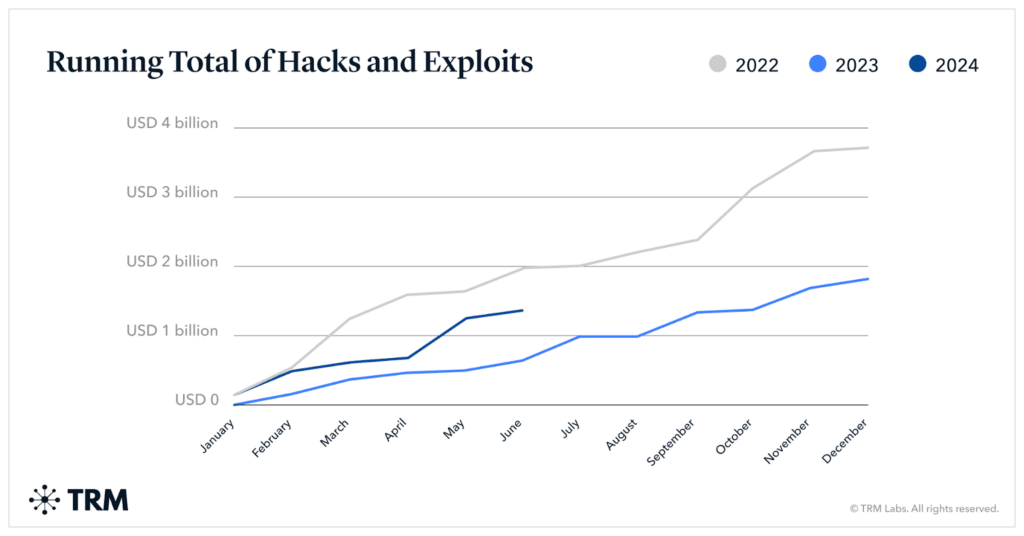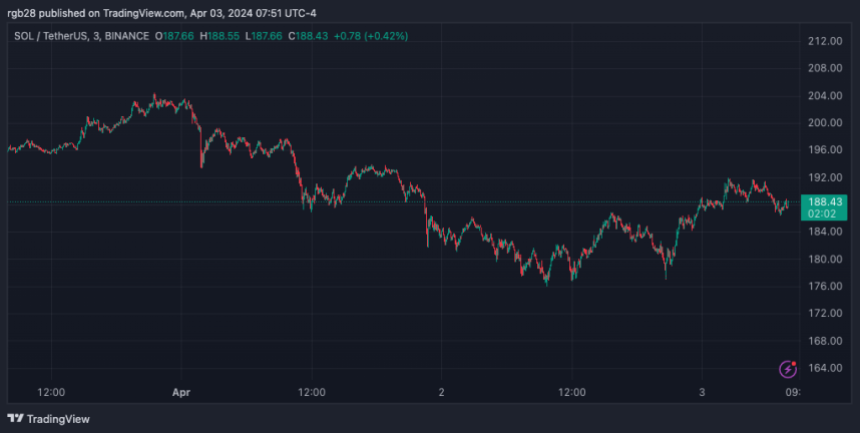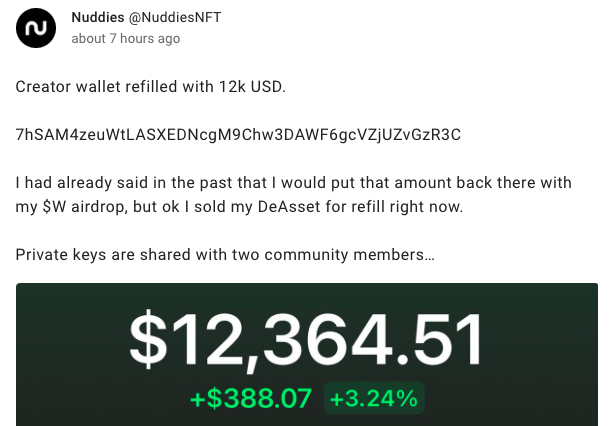Crypto scam
Crypto heists near $1.4b in first half of 2024: TRM Labs
Published
3 days agoon
By
admin
Cybercrime in the crypto sector has soared in the first half of 2024, with hackers stealing nearly $1.38 billion, nearly doubling last year’s figures.
Cybercriminals have pilfered a staggering $1.38 billion from crypto investors in the first half of 2024, nearly doubling the $657 million stolen during the same period in 2023, according to data compiled by blockchain forensic firm TRM Labs.
Consistent with 2023 trends, a handful of major breaches have dominated this year’s thefts, with the top five incidents accounting for 70% of the total haul, analysts say. The most significant attack to date occurred in May when DMM Bitcoin, a Japanese crypto exchange, suffered a hacker attack, losing over 4,500 BTC valued at over $300 million at the time.

While the nature of the hack remains unclear, TRM Labs attributes “stolen private keys or address poisoning” to potential attack vectors. “Private key and seed phrase compromises remain a top attack vector in 2024, alongside smart contract exploits and flash loan attacks,” the analysts say.
The New York-headquartered firm notes that the first six months of 2024 have seen higher theft volumes each month than the corresponding months in 2023, “with the median hack 150% larger.” Despite this surge, the analysts say thefts from hacks and exploits are a “third below the same period in 2022, which remains a record year.”
In the meantime, data from Scam Sniffer indicates that phishing scammers made over $300 million across EVM chains by targeting around 260,000 victims, marking a 6.44% increase compared to 2023. According to researchers, around $58 million worth of crypto was drained from 20 victims alone, with one victim losing $11 million, becoming the second-largest theft victim in crypto history.
Source link
You may like


The German Government Is Selling More Bitcoin – $28 Million Moves to Exchanges


BC.GAME Announces the Partnership with Leicester City and New $BC Token!


Justin Sun Says TRON Team Designing New Gas-Free Stablecoin Transfer Solution


Mt. Gox is a ‘thorn in Bitcoin’s side,’ analyst says


XRP Eyes Recovery Amid Massive Accumulation, What’s Next?


Germany Moves Another $28 Million in Bitcoin to Bitstamp, Coinbase
crypto hack
Indian police crack down on $200,000 ‘Max Crypto’ ponzi scheme
Published
1 week agoon
June 28, 2024By
admin

A resident of Mangalore, Karnataka, has been arrested for defrauding over 50 people in a cryptocurrency ponzi scheme.
According to a local report, law enforcement in Hyderabad has arrested Kunjathbail Mujib Sayyad for operating the “Max Crypto trading” ponzi.
The investigation was originally initiated in late 2022. Back then, victims alleged that Sayyad, along with other accomplices, promised lucrative returns on investments.
The scam operated via an Android application dubbed the MAX App. The scheme promised returns within 150 days from investment.
Users were also offered a two percent commission for every new investor they brought in. The commission would be higher for bigger numbers.
Owners of the scheme claimed to be connected with big cryptocurrency traders. Further, they misled investors, stating that they were headquartered in Ajman in the United Arab Emirates.
The group held local events to promote their scheme. However, the scam operated completely online, without having any physical offices in India.
According to the victims, the scheme initially paid out returns in U.S. dollars. This is a common tactic leveraged by fraudsters to gain credibility.
The scam managed to draw in small-time investors and daily wagers hoping to see their investments multiply. However, the company, along with its app, disappeared within the first 50 days of launch.
In total, the scheme managed to accumulate INR 1.66 crore, worth approximately $200,000, from 52 victims.
The case was originally registered by local police after multiple complaints and was later directed towards the Economic Offences Wing of the Cyberabad police.
Sayyad is currently facing charges under Section 420 of the Indian Penal Code for cheating and dishonestly inducing the delivery of property. Additionally, he is charged under Section 406 for criminal breach of trust, which involves misappropriating property entrusted to him, along with charges under Section 120B for being part of a criminal conspiracy.
His accomplices remain at large at the time of writing.
Scams of these sorts are quite common in developing nations like India. Scammers tend to leverage the general populace’s lack of understanding and the hype around cryptocurrencies.
Earlier this month, India’s Enforcement Directorate (ED) froze the $180 million worth of assets from an investment group alleged to be a similar Ponzi scheme.
Prior to that, the watchdog filed charges against 299 entities for operating a fraudulent scheme operating as a cryptocurrency mining investment firm.
Source link

Crypto scam ads promising wild riches have appeared on Facebook for years, yet there seems to be little progress in stopping them once and for all.
With every passing week, the number of audacious crypto scam ads online — and the unsuspecting victims losing eye-watering sums of money — continues to grow.
And to make matters worse, they’re often found on the social networks we trust the most, Facebook and X among them.
Both tech giants are losing in the battle to protect their users from fraudsters attempting to entice them with too-good-to-be-true crypto investments.
Many of these bogus ads mimic official news sites and contain false quotes from celebrities in an attempt to generate a sheen of credibility.
And while they are rapidly taken down after being reported, it’s like a game of Whac-A-Mole, with dozens more subsequently popping up in their place.
But how big of a problem is this, and what can social networks do to eradicate scam ads once and for all?
Lawsuits galore
High-profile individuals are fed up with their names and pictures being used in scam ads — prompting some to take legal action against the sites they appear on.
One of the first to head to the courts was Martin Lewis, a British journalist who is known as “Money Saving Expert” for his personal finance tips.
Given how he has long been a trusted voice on money matters, it’s easy to see how someone could be drawn into a bogus ad touting a once-in-a-lifetime opportunity.

Back in April 2018, he sued Facebook for defamation with a goal of pressuring the company into stepping up its efforts in preventing these ads from appearing.
By January 2019, Lewis had reached a settlement that included a $3.8 million donation to a new, independent project tasked with clamping down on scams.
This was certainly a step in the right direction. But more than five years on, Facebook users around the world are still being bombarded with these dangerous pages.
In a sign that history is repeating itself, an Australian billionaire has now been given the green light to sue Meta, amid claims Facebook has also profited from these adverts.
Andrew Forrest has alleged that thousands of people ended up losing millions of dollars after over 1,000 ads were plastered on the social network last year.
A common defense used by U.S. internet companies is Section 230 of the Communications Decency Act, which states it cannot be liable for content released by third parties. But Meta’s efforts to dismiss the case on this basis were rejected by a judge.

How is this happening?
BBC News recently wrote a deep dive into these scam ads, noting that its branding had often been used by criminals.
It explained that scammers are able to dupe Facebook’s detection systems by launching ads that appear to be going to a legitimate source, then quickly redirecting users.
The company says it’s now taking action to stop fraudsters using this technique.
Scam ads have also become much more prolific on X since Elon Musk’s takeover — and at times, has even rendered the site borderline unusable.
But this particular social network has a distinct problem of its own: malicious actors managing to take over the accounts of people with millions of followers.
Just last week, 50 Cent revealed that his X profile and website had been taken over by hackers to promote a crypto pump-and-dump scam — with the rapper stressing he had nothing to do with the project.
“Whoever did this made $3,000,000 in 30 minutes,” he claimed on Instagram.

Put together, it doesn’t seem like there’s been much success in making crypto scam ads a thing of the past.
That’s a big problem for the crypto industry in particular as it attempts to win round the public and shake off its image of being a “Wild West.”
So… what can be done about all of this?
Well, regulators might need to step up more.
In the U.K, one policy that’s being considered could see social networks face a fine of 10% of their global annual revenue if they fail to protect users. That could make them sit up and take notice.
And while artificial intelligence is widely being used to create these bogus ads, AI tools could also play a valuable role in tracking them down before they gain traction.
Meta’s previously said that scam ads are increasingly sophisticated, and it has ensured that fake ads can be easily reported by any of its users. Meanwhile, X says its teams “work around the clock to safeguard the platform.”
Unfortunately though, this is likely to be a problem that gets worse before it gets better.
Source link
crypto hack
Fake NFT Project Hack? CTO Vanishes After Stealing 94 SOL
Published
3 months agoon
April 4, 2024By
admin
A new rug pull alert sounded on Tuesday after crypto detective ZachXBT unveiled on-chain details of an alleged hack suffered by an NFT project last month. The project’s CTO announced that a response was in the works but ultimately vanished as criticism grew.
Nuddies NFT, A Hack Or Rug Pull?
On-chain sleuth ZachXBT revealed the alleged misuse of funds by the CTO of NFT project Nuddies NFT. In a now-deleted post, its CTO Kyle explained that the project was “derugged from its previous founder” and built differently from other NFT projects.
A short investigation into how @kyledegods faked a hack and stole SOL from his project @NuddiesNFT before spending it on NFTs and lying to holders about how devastated he was about the incident.
On March 3, 2024 Kyle made a post in his Discord server claiming his wallets had… pic.twitter.com/4ne6dtVyA5
— ZachXBT (@zachxbt) April 2, 2024
According to the crypto detective, Kyle faked a hack that seemingly stole the project’s funds. On March 3, the alleged culprit posted on the Nuddies NFT Discord server, informing us of the hack.
The post affirmed that Kyle’s Mac was hacked despite “not clicking in any malicious link.” The CTO concluded that a “zombie process” was on his computer for an undetermined period.
This “mini-program” gave control of the computer to “the hacker.” Through the TeamViewer app the attacker gained access to the project and Kyle’s wallets. The post further explained that 90 SOL, approximately $17,000 at today’s price, were taken from the Nuddies NFT creator wallet.
Moreover, the hacker allegedly took control of Kyle’s Discord and stole 150 SOL, worth around $28,300, from his wallets. At the time, he claimed to be “mentally destroyed” by the loss of the project’s treasury money.

SOL is trading at $188.43 in the 3-day chart. Source: SOLUSDT on Tradingview.com
Nonetheless, the on-chain data compiled by ZachXBT tells a different story. Per the crypto detective’s post, the CTO allegedly lied to the holders and stole the 94 SOL, worth $12,000, when the incident occurred.
The post reveals that the funds were transferred during that day from the Nuddies Royalty Wallet to an exchange deposit at 8:20 UTC. The on-chain investigator claims that a destination transaction was found using time analysis. The transaction to one of Kyle’s wallets accounted for 3.42 ETH, around $11,700, at 8:21 UTC.
The ETH was seemingly used to buy two NFTs: DeGods 2921 and y00t 10991. The DeGod NFT was used as the CTO’s profile picture on X until yesterday.
CTO Answers The Accusations, Then Vanishes
The accusations didn’t go unnoticed by the suspect, who posted on his X account that he was “preparing the answer” with a wink face emoji. After changing his profile picture, Kyle answered some users’ questions about his credibility, to which he replied that his “conscience is clear.”

Now-deleted post from Nuddies' CTO Kyle. Source: X
In the early hours of Wednesday, Nuddies NFT account shared a now-deleted post informing that the creator wallet was “refilled with 12k USD.” In the post, Kyle reassured that his previous claims of intending to refill the wallet were authentic.
The CTO also claimed he was “waiting for his $W airdrop” to fulfill his promise instead of selling his DeAsset. Additionally, he “stepped out” of the project after giving the access keys to two community members.

Recovered excerpt from the deleted Nuddies NFT post. Source: X
However, the story doesn’t end there. Kyle and Nuddies NFT’s account were deleted a couple of hours after the post. The Nuddies website seems not to be working, as reported by an X user.
The project’s future is unsure as one of the community members to whom Kyle gave the access keys was unaware of the situation. Juiceddd, an NFT artist, is one of the two people in charge of the project.
The artist explained that he was responsible for redrawing the entire Nuddies collection while adding “70+ new traits.” Moreover, Juiceddd stated that he “woke up this morning to being the owner of everything.” The artist is contemplating giving his perspective on the incident as he considers that it is generally the artist who “gets fucked” in these situations.
Featured Image from Unsplash.com, Chart from TradingView.com
Disclaimer: The article is provided for educational purposes only. It does not represent the opinions of NewsBTC on whether to buy, sell or hold any investments and naturally investing carries risks. You are advised to conduct your own research before making any investment decisions. Use information provided on this website entirely at your own risk.
Source link

The German Government Is Selling More Bitcoin – $28 Million Moves to Exchanges
BC.GAME Announces the Partnership with Leicester City and New $BC Token!

Justin Sun Says TRON Team Designing New Gas-Free Stablecoin Transfer Solution

Mt. Gox is a ‘thorn in Bitcoin’s side,’ analyst says

XRP Eyes Recovery Amid Massive Accumulation, What’s Next?

Germany Moves Another $28 Million in Bitcoin to Bitstamp, Coinbase

'Asia's MicroStrategy' Metaplanet Buys Another ¥400 Million Worth of Bitcoin

BlackRock’s BUIDL adds over $5m in a week despite market turbulence

Binance To Delist All Spot Pairs Of These Major Crypto

German Government Sill Holds 39,826 BTC, Blockchain Data Show

HIVE Digital stock rallies over 9% as Bitcoin miner bolsters crypto reserves to 2.5k BTC

Pepe Price Analysis Reveals Bullish Strength As Bitcoin Plummets

Taiwan is not in a CBDC rush as central bank lacks timetable

Will SHIB Price Reclaim $0.00003 Mark By July End?

The power of play: Web2 games need web3 stickiness

Bitcoin Dropped Below 2017 All-Time-High but Could Sellers be Getting Exhausted? – Blockchain News, Opinion, TV and Jobs

What does the Coinbase Premium Gap Tell us about Investor Activity? – Blockchain News, Opinion, TV and Jobs
BNM DAO Token Airdrop
A String of 200 ‘Sleeping Bitcoins’ From 2010 Worth $4.27 Million Moved on Friday

NFT Sector Keeps Developing – Number of Unique Ethereum NFT Traders Surged 276% in 2022 – Blockchain News, Opinion, TV and Jobs
New Minting Services

Block News Media Live Stream

SEC’s Chairman Gensler Takes Aggressive Stance on Tokens – Blockchain News, Opinion, TV and Jobs

Friends or Enemies? – Blockchain News, Opinion, TV and Jobs

Enjoy frictionless crypto purchases with Apple Pay and Google Pay | by Jim | @blockchain | Jun, 2022

How Web3 can prevent Hollywood strikes

Block News Media Live Stream

Block News Media Live Stream

Block News Media Live Stream

XRP Explodes With 1,300% Surge In Trading Volume As crypto Exchanges Jump On Board
Trending

 Altcoins2 years ago
Altcoins2 years agoBitcoin Dropped Below 2017 All-Time-High but Could Sellers be Getting Exhausted? – Blockchain News, Opinion, TV and Jobs

 Binance2 years ago
Binance2 years agoWhat does the Coinbase Premium Gap Tell us about Investor Activity? – Blockchain News, Opinion, TV and Jobs
- Uncategorized3 years ago
BNM DAO Token Airdrop

 Bitcoin miners2 years ago
Bitcoin miners2 years agoA String of 200 ‘Sleeping Bitcoins’ From 2010 Worth $4.27 Million Moved on Friday

 BTC1 year ago
BTC1 year agoNFT Sector Keeps Developing – Number of Unique Ethereum NFT Traders Surged 276% in 2022 – Blockchain News, Opinion, TV and Jobs
- Uncategorized3 years ago
New Minting Services

 Video2 years ago
Video2 years agoBlock News Media Live Stream

 Bitcoin1 year ago
Bitcoin1 year agoSEC’s Chairman Gensler Takes Aggressive Stance on Tokens – Blockchain News, Opinion, TV and Jobs

